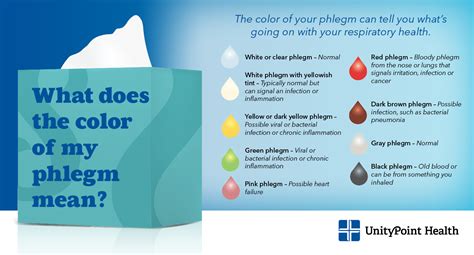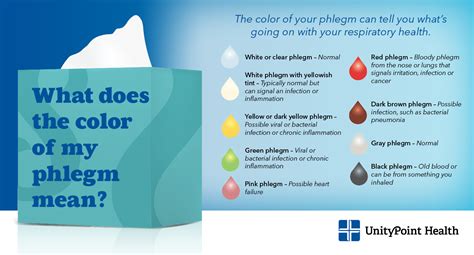Intro
Discover the causes and symptoms of blood in phlegm, including coughing up blood, chest infections, and respiratory issues, to understand when to seek medical help for this concerning condition.
The presence of blood in phlegm can be a concerning symptom for many individuals. Phlegm, a thick and sticky substance produced by the mucous membranes in the respiratory tract, is usually clear or white in color. However, when it contains blood, it can be a sign of an underlying health issue that requires medical attention. In this article, we will delve into the possible causes, symptoms, and treatment options for blood in phlegm, as well as provide valuable insights and practical advice for managing this condition.
The respiratory system is a complex and delicate mechanism that is prone to various infections, irritations, and diseases. When the lungs or airways become inflamed or infected, the body produces excess mucus to trap and eliminate the invading pathogens. In some cases, this excess mucus can contain blood, which can be a sign of a more serious underlying condition. Blood in phlegm can be caused by a range of factors, including respiratory infections, chronic diseases, and environmental factors.
Causes of Blood in Phlegm

Infectious Causes
Infectious causes of blood in phlegm are often characterized by the presence of other symptoms, such as fever, cough, and shortness of breath. Respiratory viruses, like the flu or common cold, can cause inflammation and irritation in the airways, leading to the production of excess mucus and blood. Bacterial infections, like pneumonia or bronchitis, can also cause blood in phlegm, especially if left untreated or if the infection is severe.Non-Infectious Causes
Non-infectious causes of blood in phlegm are often related to chronic diseases or environmental factors. Chronic diseases like COPD, asthma, or cystic fibrosis can cause inflammation and damage to the airways, leading to the production of excess mucus and blood. Environmental factors like air pollution or smoking can also irritate the airways and cause inflammation, leading to blood in phlegm.Symptoms of Blood in Phlegm

Common Symptoms
Common symptoms of blood in phlegm include: * Coughing up blood-tinged mucus * Shortness of breath * Wheezing * Chest pain * Fever * Chills * FatigueSevere Symptoms
In severe cases, individuals may experience more severe symptoms, such as: * Difficulty breathing * Severe chest pain * Coughing up large amounts of blood * Fever above 102°F (39°C) * Confusion or disorientationTreatment Options for Blood in Phlegm

Medications
Medications may be prescribed to treat the underlying infection or manage symptoms. Common medications include: * Antibiotics * Antiviral medications * Bronchodilators * Expectorants * Pain relieversLifestyle Changes
Lifestyle changes can also help manage symptoms and prevent future episodes of blood in phlegm. Common lifestyle changes include: * Quitting smoking * Avoiding air pollution * Staying hydrated * Getting plenty of rest * Practicing good hygienePrevention and Management

Practical Tips
Practical tips for managing blood in phlegm include: * Staying hydrated by drinking plenty of fluids * Getting plenty of rest to help the body recover * Practicing good hygiene to prevent the spread of infection * Avoiding irritants like smoke and air pollution * Managing stress through relaxation techniques like meditation or deep breathingConclusion and Next Steps

We invite you to share your thoughts and experiences with blood in phlegm in the comments below. Have you or someone you know experienced this condition? What steps did you take to manage symptoms and prevent future episodes? Your input can help others who may be going through a similar experience.
What are the common causes of blood in phlegm?
+Blood in phlegm can be caused by a range of factors, including respiratory infections, chronic diseases, and environmental factors.
How can I manage symptoms of blood in phlegm?
+Managing symptoms of blood in phlegm involves a combination of lifestyle changes and medical treatment, including staying hydrated, getting plenty of rest, and practicing good hygiene.
When should I seek medical attention for blood in phlegm?
+It is essential to seek medical attention if you experience severe symptoms, such as difficulty breathing, severe chest pain, or coughing up large amounts of blood.
